- Home
- Lilith Saintcrow
The Bandit King h-2 Page 10
The Bandit King h-2 Read online
Page 10
Why am I even here? Weariness threatened to swallow me whole. Because Vianne wishes it. I strode for the door. Did I stay longer, there was no telling what idiocy I would give voice to next. Or what weapon I would give him to strike me later with.
“Tristan.” For the first time, my father sounded old. “Tristan, m’fils, wait—”
I did not. I stalked into the hall, and Tinan di Rocham hurriedly scrambled to his feet from the padded bench across the hall. I dismissed him with a gesture, and such was his instinctive obedience that he froze long enough for me to disappear up a staircase and into the Keep’s depths.
* * *
The familiar hall was empty, but I did not show myself. Instead, I waited, breathing lightly and silently, tucked into a shallow alcove behind a tapestry. The passage leading here was thick with dust, tickling my nose as I waited, my gaze sliding from near to far, alert to any slight movement.
It still took longer than I liked.
When I was certain I knew, I stepped lightly back and followed the hidden passage for a long fifteen steps, then slid out from behind another tapestry and a wooden stand holding slowly-rusting pikes from the di Roncail’s time. Quietly, softly, I paced to the corner and peered down the hall once more.
There it was again, that same flicker of motion. I strolled around the corner as if I had not a care in the world, my hands aching for my rapier-hilt. But no—for this, twas knifework, and I could not draw yet.
I did not wish to be caught approaching her door blade-in-hand. Appearances lied, yes—and she did not need another reason to mistrust me.
I was almost past his hiding place when the Knife exploded into motion, a flash I almost did not catch. Even though I was prepared, the bastard was quick.
I was down in a heartbeat, shoulder driven into his midriff and both of us flung on the stone floor with bruising force. He made no sound, the same black-bladed knife not lifted but held low and trapped between us, for I had taken the precaution of carrying a filched doublet over my arm. A knife is only as effective as the reach of its wielder. And cloth, any cloth, as a baffle is preferable to stopping a blade with one’s flesh.
He heaved, boots scrabbling, seeking to free his arm, but I had him pinned. Taller and broader, my weight was an advantage, and he had no companions to help—the rest of his trio had been slain the night of their attack on the Keep.
“Cease!” I hissed in my heavily-accented Pruzian. For a moment I regretted not telling Vianne I was familiar with the tongues of Arquitaine’s enemies; it could have been useful to hear what she would have had me translate into his native speech. “I mean her no harm. Do not force me to kill you.”
I wrenched the knife free of his fingers, but I did not relax. No assassin worth the name carries only one weapon. The prick of the blade near his belly, where I only had to turn my wrist to drive it home and gut-cut him, calmed the situation somewhat.
He went limp, breath coming in harsh gasps. Both of us sweated, a rankness of fear and violence filling the hall.
“I understand your tongue,” I told him in Arquitaine. “And you understand mine.”
A nod, his clubbed hair moving against dusty stone. The glaring damage to his face, though charmed and healing, was unpretty in the extreme. Though he would never win prizes even at the best of times. Pruzians are an unlovely race, ill-favored, even though the ruddy-blond Damar—who they claim kinship and share some language with—are sometimes passing fair.
“Now.” I thought it likely I had his attention. “What are we to do with each other, Pruzian? I do not like how close you are to my d’mselle.”
“I am to protect her,” he hissed in grinding Pruzian. “From you.”
Hardly unexpected, but it still scored me. No trace showed; at least, I hoped it did not. “She needs no protection from me, friend.” Heavy sarcasm on the last word. “In fact, she is safer with me than without. I do not trust a Knife whose aufsbar is still alive.”
“He is not my client now, dogfaced minstrel.” The insult sounds truly hideous in Pruzian. “My client is behind that door.”
“You are a whoreson, and a liar, friend.” Insults in Arquitaine have their own rhythm. “Your client is here with a knife to your belly. Three times I could have killed you now, and I’ve refrained. You work for me.”
He thought this over. “You cannot pay me eno—”
My wrist tensed. The knifepoint slid through a layer of fabric, and he went very still. Cold sweat lay against his cheeks and brow; I found myself hoping nobody would appear at the far end of the hall. “I do not need to pay you.” I changed to Pruzian. “For the black bird rises…”
“And the dead tree blooms,” he answered automatically, then realized what a weapon he had handed me. “No. No—”
I took that passphrase from a man much harder to trap than you will ever be. “Oh, yes. I am much more than I appear, Knife. I am your brother now, and if you deal fairly with me, I may let you live.” And he was brave even as the blade was in his belly. My skin crawled at the memory. I had not dealt fairly with the last Knife I had held at bladepoint. But it had been necessary.
Just as this was.
“You are none of ours.” He did not sound happy.
“You are bound to brotherhood now that you have answered, Knife. Now, will you be reasonable, or do we learn the look of your guts?”
I have seen defeat in faces of every shape and station, and his was no different than any other’s. “You are my master, mil’Hier. What shall I do?”
I eased aside, gained my feet. Extended my free hand carefully, the knife ready. “Wait, and watch. Keep m’d’mselle safe when I am called away. And be ready.”
“For what?” He lunged upright, using my hand, and did not seek to pull me off-balance. Well enough. We would see if the passphrase I had tortured out of another Pruzian Knife held good.
I had gained the knowledge—the phrase, and how to use it—during Henri’s long-ago royal visit to the border province of Mietsiere, to negotiate an extended trade agreement. The Pruzians had brought not only their diplomats but a few trios of Knives as well, but after the first trio vanished and the third’s lone limping survivor expired broken and bleeding on the steps of the temporary residence of the Damarsene ambassador, negotiations became much less… complex.
“You shall see.” Enigmatic enough, I decided. “When is your duty at her door done?”
“Four hours.” Grudging, the man examined me.
“And who comes to relieve you?” I could still feel the pleasure of ordering him shoved into an oublietta. Vianne had rescued him, and I found myself almost grateful to her soft heart. Had it been one of the Guard at her door, I might have had a harder time of it. He was, after all, only a Pruzian. No match for a nobleman, and his blood would carry precious little guilt.
He shrugged, spreading his hands.
“Very well. Is the door locked?”
Another shrug.
I gave a soft token rap, tried the knob carefully. It was not locked. The Knife stiffened, and I could see the hole in his doublet. I had been very close to eviscerating him.
“Easy, mil’Brödenr,” I told him. “She is in no danger.” Unless it is from you.
I twisted the knob, and stepped through.
Chapter Fifteen
The cup on the night-table held the remains of a thick, sticky-red hedgewitch brew. A bitter tinge to its odor warned me, and when I touched the residue with a cautious fingertip, numbness slid up my finger. I hurriedly wiped my hand clean on my breeches.
Bell’s-ease, bleeding mallow, and ghostberry. A powerful draught, one capable of drugging even a sedative-resistant hedgewitch into insensibility. A dangerous mix, as well—too much ghostberry and the heart pounds itself to pieces, too much bell’s-ease and the languor ceases the circulation instead of merely inducing restorative sleep. Bleeding mallow was for the grievously wounded, or those whose ills could not be cured and whose passage needed easing.
Despite the st
rength of the draught, she moved uneasily as my shadow fell over the bed. Her arms were up, cradling her head, and the sound she made—a slow, terrible moan of pain—tore something inside my chest.
The half-head. She had kicked free one soft velvet slipper, meant to keep a woman’s feet from the chill of stone floors; her small feet worked uselessly, seeking an escape from the pain. The Aryx shivered, a thick note of distress not heard by the ears, but thudding through the bones.
Dear gods. I dropped the knife onto the night-table, almost touched her hair. Caught myself. The light is painful for her. So is sound. Well, then.
Court sorcery is not very practical unless one wishes a duel or a delicate illusion. But there are things that can be done with light and air—a simple bit of work to plunge the room into utter darkness, a muffling-charm to deaden noise. Blackness lay against my eyes, and I found the edge of the bed by touch. My swordbelt fell to the ground, useless against this foe.
Slowly, carefully, I sank down, wincing each time she moved.
She sighed. Her hair was loose and tangled. Her brow was fever-damp; I pressed my fingers against her lips and felt the passage of her breath.
All is well, I wanted to whisper. I am here.
And now that I was, layers of cloth between us but the shape of her underneath remembered with fierce exactness, the familiar urge to touch what I could all but shook me.
There is a blind part in any man, who thinks it perhaps easier to take than to ask. If he denies it, he is lying. He who does admit it is a liar as well, for a man will never admit to the full depths of what he is tempted to commit when a woman is that close, and that helpless, and so achingly sweet.
Even after she had me clapped in chains and turned from me in disgust, even after she unwittingly caused my downfall, even as she drove me past every shred of honor or decency, she was still…
She is not to blame. You are the criminal here.
And what did it say of me, that even as she writhed with pain, my thoughts turned in such a direction?
My hands tensed, to keep them from roaming. She gasped, stiffening, and struggled. “Be still,” I whispered in her ear, stroking sweat-damp curls back. The sound-deadening charm held us in a bubble of stillness, absolute blackness pressing fiery phantom images against my eyelids. “Shhh, m’chri. Let the draught work.”
“T-T-Tr—” The sedation betrayed her, made the attempt slow and slurred. “Tris. Is… it… time?”
Time for what? I did not care to guess. “Sleep.” She was in too much agony to note the effect she had on me; I am no more than flesh, after all. “I would take the pain for you.” My whisper was a bare mouthing of the words, but it still hurt her. She moved, restless. The half-head makes every murmur a gouging inside the skull; any light is a spear of misery. I sought to say no more, simply pressed my lips against her temple and held her. Clumsy, I had not removed my boots, but she did not move again when I wrapped my leg over hers, the irritating fabric between us a bar against the animal in my flesh, and I did my best to hold her so tightly the pain could not slip between us.
* * *
A cold, sharp point touched my throat.
I half-opened my eyes, lunging into wakefulness though my body did not dare move. On my back, arms spread wide, I was seemingly helpless—and Vianne stood at the bedside, one knee braced near my hip, the black-bladed knife to my throat, her hair a tangled mess and bright fever-spots on her gaunt cheeks. She was shaking; her half-unlaced dress had slid aside to expose a slice of her pale, perfect shoulder, and I realized the light through the window was morning.
I felt more clear-headed than I had in a very long while.
“How did you—” She halted, perhaps aware of the uselessness of the question. “What are you doing?”
I barely even dared swallow, the point at my throat was so keen. I took refuge in levity. “Hoping your temper improves?”
“My temp—” she began, but I had her wrist locked and surged up from the bed. She stumbled back, . I kept pressing her, and her shoulders hit the wall near a low bookcase, next to the watercloset door. Her wrists were so thin; she struggled uselessly. Even fresh from the donjon I was more than a match for her slightness. She did not let go of the knife, though I kept it well away, her arm stretched overhead.
“You were saying.” I pressed against her. “About your temper.”
She heaved against me, achieved nothing. The fine down at her temple was edged with gold; gold threaded through the dark honey of her tangled curls as well. The urge to lean a little closer and bury my face in her hair all but made me sweat.
“Sieur.” Brittle and haughty, she lapsed into stillness. “What must I do to free myself of you? Take your hands from me.”
“Oh, I don’t think so, m’chri.” She was so thin, I felt her ribs as I leaned against her. I eased my grip on her wrists slightly. She might well snap in half, did I press too harshly. “Not until you listen.”
“Listen to what? You were to be examined in Council, you—”
“I did not care to have a clutch of old men wasting my time while you were abed with a half-head.” I noted the shadows under her eyes had eased somewhat, and was grateful for that, at least. “My place is with you, Vianne. At your side, so the foolishness you fling yourself into does not kill you. I will not have that.”
It was not what I had intended to say.
“You did kill the King.” She all but choked on the words. “You did. Get away from me!”
A lie trembled on my lips. I had it prepared, the words that would make this salvageable. To soothe her, to lead her away. To repair what I could, to build on the foundation I had laid last time she was this close to me. She had not believed then, but now, perhaps, I had a moment’s worth of her weakness to use.
Instead, I heard myself say dully, “Yes.”
What am I doing?
“Yes,” I repeated, a trifle louder. “Very well, yes. It was a choice. Between Henri, and you. I would do it again, did the gods grant me another chance.” As many times as necessary.
She hung in my grasp. Her eyes were so dark, I had not found their true color until our wedding-night. Indigo, the deepest summersky evening shade before night truly falls. And now I wondered at her expression, for she seemed as amazed as I was by the admission.
Every lie I had thought to hide behind broke inside me.
“Tristan…”
“Tis very simple, Vianne.” My fingers eased, slid up her hand. I did not take the knife from her. I lowered it, the point trembling, and it touched my cheek. Cold metal, and the Pruzian would no doubt be happy to see my blood on it. “I am a traitor; make me bleed for it. I am more useful alive, though. You need me for the Aryx, you need me for protection, you simply need me. But do it, if you like. I am at your service.”
In every way.
The relief was immense, as if I had just spent myself in her. I had not realized the constant draining tension of examining her face, guessing if she knew or did not, if she suspected, what she would think of my actions. Instead, she knew, and I was exposed to her in a way I never had been.
“I did not truly believe…” She stared as if seeing me for the first time, or as if I had suddenly melted into a loathsome monster, a demieri di sorce with claws and fangs ready to rend and eat human flesh. “I thought to shelter you from whatever game the Duc had planned. I thought to protect you.”
By throwing me in a donjon? But, of course. It made a great deal of sense now—she had perhaps thought to draw out whatever traitors lurked in the shadows by allowing them to think me disgraced and thus, of little value as a means to wound her.
And possibly, amenable to treachery. Which, after all, she had not believed me capable of.
Why had I not thought of it? Too clever by half, d’Arcenne. The pain behind my ribs mounted another notch, and despite it, I felt a curious comfort. There was no way to salvage this. I had become my own undoing.
“If this is protection, Vianne, I should hat
e to see its opposite.”
I did not mean it cruelly. And yet, as soon as the words escaped, they sounded brutally ill-mannered, and much too sharp. I meant only to provoke her into an explosion, for after a woman rages she is usually amenable to reason. Or, at least, to smooth words. I have used such a strategy once or twice.
I should have known it would not work on her.
Utterly still, those fever-spots in her cheeks glaring at me, the pulse beating in her throat. “Lisele,” she whispered, her lips shaping the sibilant most fetchingly.
It took me a moment to decipher the sudden turn of her thoughts. Her Princesse, Henri’s half-Damarsene daughter. “I did not know they were to kill the Princesse.” It was my turn to swallow dryly. “She was to be married. To the Damarsene. In your stead.”
If I thought her pale before, she was ashen now. “In my…”
“Yes.” Was this what the saying truth is its own reward meant? The feeling of exquisite nakedness, the idea that she, at last, was truly seeing me?
Her eyes narrowed, as a mountain-pard’s the moment before it strikes.
A lick of fire tore down my cheek. The knife plunged, its tip glancing along my chest and tearing through shirt and skin both. Blood flew, and Vianne let out a despairing sound. I twisted her wrist, bruising-hard, and my mouth caught her cry as the knife chimed on stone, flung free. Kisses between us were often shy, tentative; this one was not. Copper and spice filled my mouth, she bit my lip hard enough to add to the bleeding, and I held her pinned as she writhed and fought.
For once, I did not ask. I took what I wanted from her. What she had, what she could give, what I would die without. I kissed her even as the blood welled and the wounds burned, the Aryx between us shifting against cloth and skin, metal scorch-hot and her fingers tangled in my hair, wrenching hard enough to add more fury to the explosion between us.
It was not Graecan fire, but it burned nonetheless. Across the room in a tangle of hot blood and her fevered mouth, tipped onto the bed’s sinking depth, and it was Vianne in my arms again, her softness and the marks of her nails in my back. The hot tight core of her, desperation shaking her limbs and her teeth driven into my shoulder—twas deadly-silent as a back-alley assassination, neither of us weakening enough to give so much as a moan. Tears welling from her closed eyelids, the blood smeared between us, and when at last I let myself careen over the edge, helplessly shaking in her arms, the Aryx burning between us like a star, she wept as if her heart would break.

 Incorruptible
Incorruptible Finder (The Watchers Book 6)
Finder (The Watchers Book 6) Steelflower in Snow
Steelflower in Snow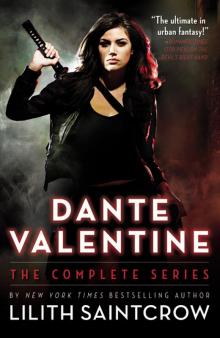 Dante Valentine
Dante Valentine Redemption Alley-Jill Kismet 3
Redemption Alley-Jill Kismet 3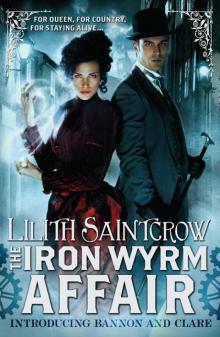 The Iron Wyrm Affair
The Iron Wyrm Affair The Demon's Librarian
The Demon's Librarian The Hedgewitch Queen
The Hedgewitch Queen Redemption Alley
Redemption Alley Flesh Circus
Flesh Circus Saint City Sinners
Saint City Sinners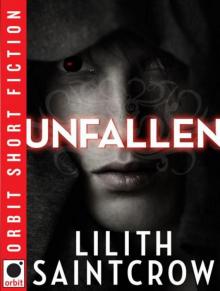 Unfallen
Unfallen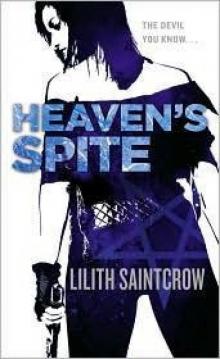 Heaven’s Spite
Heaven’s Spite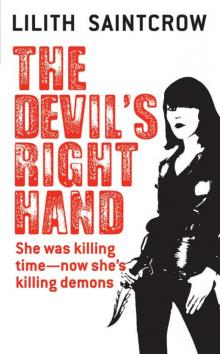 The Devil s Right Hand
The Devil s Right Hand Roadside Magic
Roadside Magic Steelflower at Sea
Steelflower at Sea Agent Gemini
Agent Gemini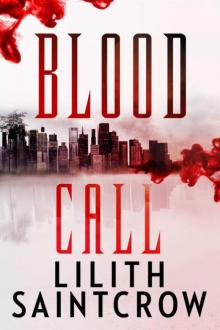 Blood Call
Blood Call Agent Zero
Agent Zero In The Ruins
In The Ruins Atlanta Bound
Atlanta Bound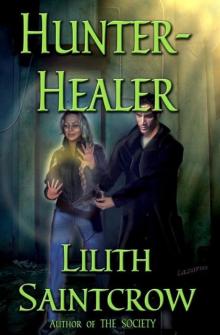 Hunter, Healer
Hunter, Healer Hunter's Prayer
Hunter's Prayer Roadtrip Z_Season 2_In The Ruins
Roadtrip Z_Season 2_In The Ruins Wasteland King
Wasteland King Pack
Pack Flesh Circus - 4
Flesh Circus - 4 Trailer Park Fae
Trailer Park Fae The Bandit King h-2
The Bandit King h-2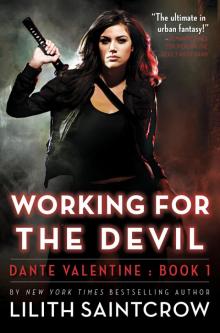 Working for the Devil
Working for the Devil Pocalypse Road
Pocalypse Road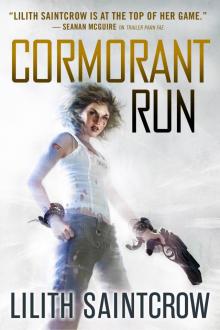 Cormorant Run
Cormorant Run Dante Valentine Book 5 - To Hell and Back
Dante Valentine Book 5 - To Hell and Back Desires, Known
Desires, Known Roadtrip Z (Season 3): Pocalypse Road
Roadtrip Z (Season 3): Pocalypse Road Afterwar
Afterwar Selene
Selene The Society
The Society The Hedgewitch Queen h-1
The Hedgewitch Queen h-1 Night Shift jk-1
Night Shift jk-1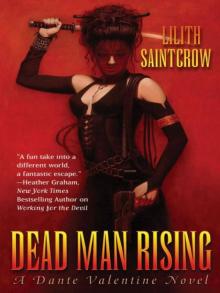 Dead Man Rising
Dead Man Rising Dead Man Rising dv-2
Dead Man Rising dv-2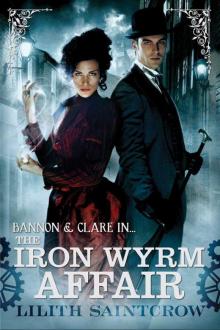 The Iron Wyrm Affair: Bannon and Clare: Book 1
The Iron Wyrm Affair: Bannon and Clare: Book 1 Saint City Sinners dv-4
Saint City Sinners dv-4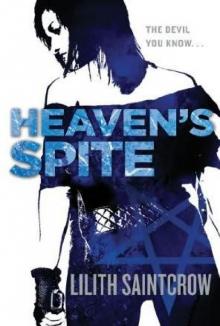 Heaven's Spite jk-5
Heaven's Spite jk-5 Beast of Wonder
Beast of Wonder Hunter's Prayer jk-2
Hunter's Prayer jk-2 The Damnation Affair
The Damnation Affair Steelflower
Steelflower The Red Plague Affair: Bannon & Clare: Book Two
The Red Plague Affair: Bannon & Clare: Book Two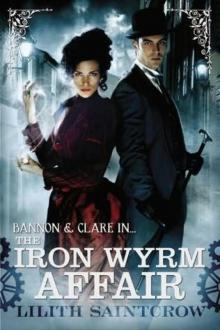 The Iron Wyrm Affair tb&ca-1
The Iron Wyrm Affair tb&ca-1 Flesh Circus jk-4
Flesh Circus jk-4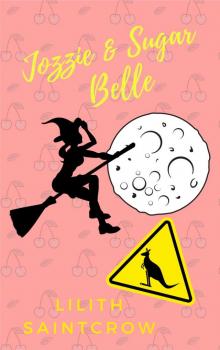 Jozzie & Sugar Belle
Jozzie & Sugar Belle Night Shift
Night Shift The Bandit King
The Bandit King![Hunter, Healer [Sequel to The Society] Read online](http://i1.bookreadfree.com/i1/04/05/hunter_healer_[sequel_to_the_society]_preview.jpg) Hunter, Healer [Sequel to The Society]
Hunter, Healer [Sequel to The Society] The Devil's Right Hand dv-3
The Devil's Right Hand dv-3 To Hell and Back dv-5
To Hell and Back dv-5 Angel Town
Angel Town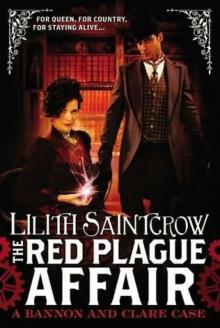 The Red Plague Affair tb&ca-2
The Red Plague Affair tb&ca-2 Redemption Alley jk-3
Redemption Alley jk-3 The Damnation Affair (the bannon & clare affairs)
The Damnation Affair (the bannon & clare affairs) Working for the Devil dv-1
Working for the Devil dv-1